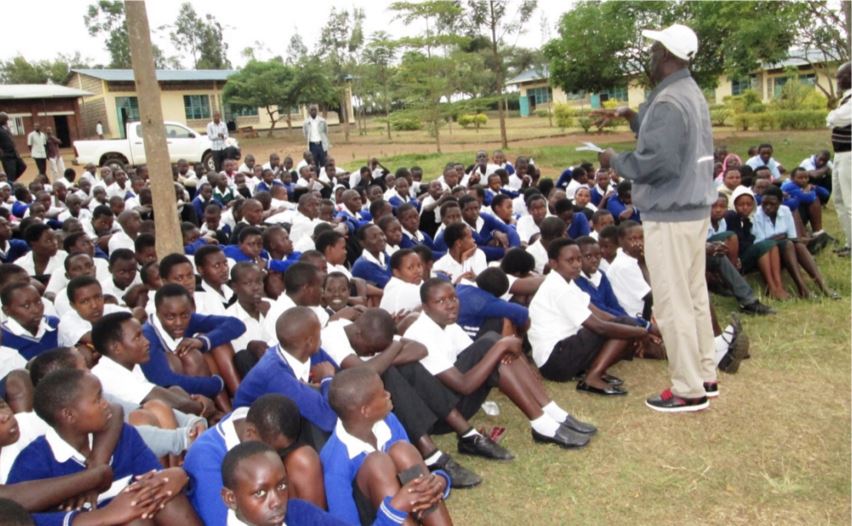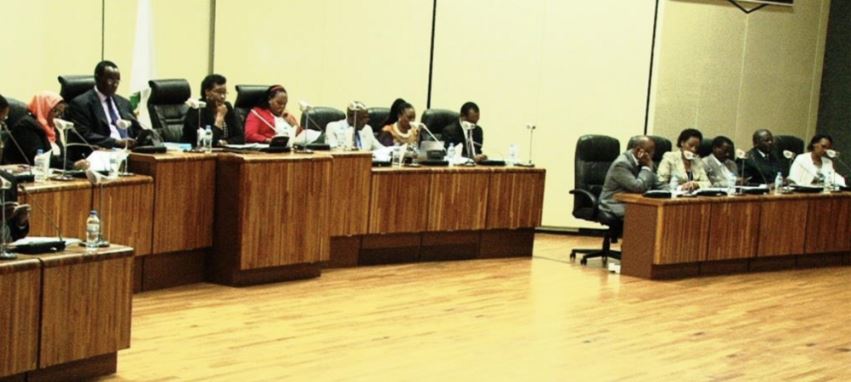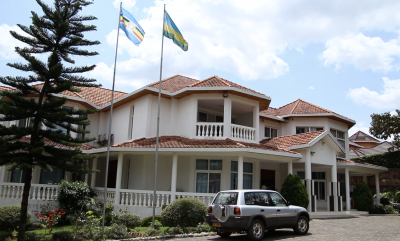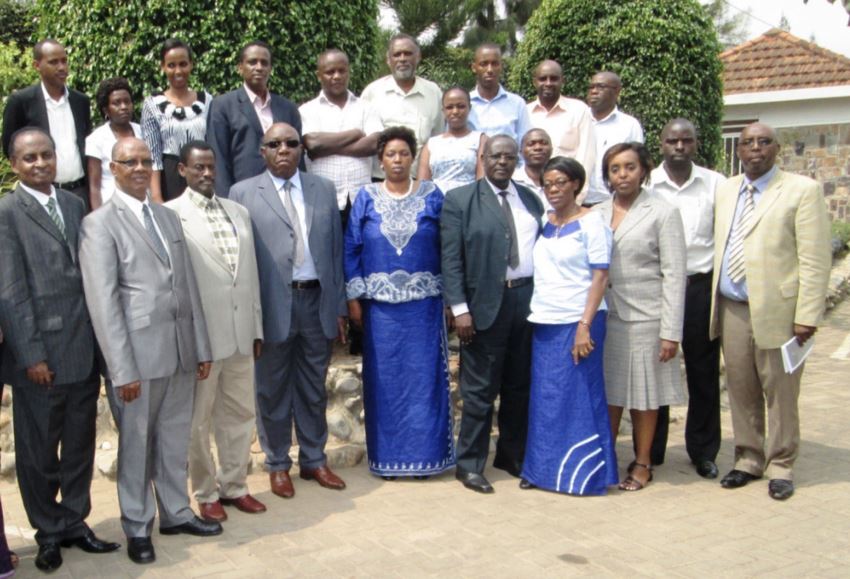Rwanda: Promoting the Rule of Law and Culture of Human Rights

The origins of the National Commission for Human Rights (NCHR) date back to the Arusha Peace Agreement of August 1993 between the Government of Rwanda of that time and the Rwanda Patriotic Front, in its Protocol on the Rule of Law. The creation of a National Human Rights Commission was a prerogative to the establishment of the Rule of Law due to the fact that Rwanda has in the past experienced prolonged periods of regimes that massively violated human rights and had a culture of impunity that culminated in the 1994 genocide.
The National Commission for Human Rights was created by the Law n° 04/99 of 12th March 1999 modified and complemented by the Law n° 35/2002 of 31st December 2002. This Law was replaced by the Law n° 30/2007 of 6th July 2007 determining the organization and functioning of the National Commission for Human Rights based on the Constitution of the Republic of Rwanda of 2003 revised in 2015. Recently, so as to comply with the Paris Principles, the Law n° 30/2007 of 6th July 2007 has been replaced by Law n° 19/2013 of 25 March 2013 determining the mission, organization and functioning of the National Commission for Human Rights.
Article 42 of the Constitution of the Republic of Rwanda of 2003, revised in 2015, states that “The promotion of human rights is a responsibility of the State. This responsibility is particularly exercised by the National Commission for Human Rights. This Commission is independent”.
The NCHR presenting its annual report before the both chambers of Parliament
The National Commission for Human Rights submits each year its program of activities and activity report to both Chambers of Parliament in a joint session and reserves copies thereof to President of the Republic, the Cabinet and the Supreme Court. The Rwanda National Commission for Human Rights is entrusted special missions as provided for by Article 5 of Law n° 19/2013 of 25/03/2013 regarding the promotion and protection of human rights. It has also ordinary powers as stated in Article 7 of the same law.
In order to fulfill its missions, the National Commission for Human Rights, educates and sensitizes different categories of the population on matters relating to human rights and participates in the development of Human Rights educational programs. Those categories include local leaders and security organs, those who meet and interact with many persons like religious communities, youth, vulnerable people, cooperatives and non-governmental organizations and volunteers of the Observatory of children rights among others.
The Commission focuses on sensitizing those categories of people on matters relating to human rights in order to establish the culture of the Rule of law and the culture of respect of human rights sustainably in Rwanda. The sensitization aims at providing the Rwandan population with basic knowledge on human rights and disseminating human rights principles to many people. The Commission delivers messages through media and commemoration of annual international human rights days.
Regarding the messages delivered throughout media, the National Commission for Human Rights produces a weekly broadcast under the title of “Uburenganzira iwacu” (Rights at home) on radio under various themes relating to Human Rights and ones relating to its activities aimed at promoting and protecting Human Rights.
In addition, the National Commission for Human Rights sensitizes the Rwandan population on human rights through national radio and TV and on various private radio stations operating in Rwanda. The Commission also holds press conferences at its Head Office aiming at presenting to the journalists the state of human rights in Rwanda. Hence, journalists seize the opportunity to ask other questions related to the mission and functioning of the Commission or those related to the breaking news about the current situation of human rights in Rwanda.
Furthermore, the Commission organizes training workshops and seminars aiming at providing or increasing participants’ capacity in order to promote the respect of the laws and principles of human rights by decision makers or the population’s Counselors. Those training workshops and seminars help in the prevention of violation of human rights and in building the culture of human rights respect in the Country. It also collaborates with other state organs in designing strategies to prevent violations of human rights and provides views, upon request or at its own initiative on laws, regulations of public organs in force in the country and bills so as to ensure their conformity to fundamental principles of Human Rights. Regarding the protection of human rights, the Commission focuses on protecting human rights, through the follow up of complaints submitted to it, upon request or at its own initiative. Most cases of the human rights abuse that the Commission keeps investigating on are the right to life, right to justice, right to property, right to education, right to employment, among others. The Commission also monitors respect for the rights of the child, women, persons with disabilities, people living with HIV/AIDS, refugees, migrant workers and members of their families and elderly to verify whether their living conditions meet the international human rights standards.
Regarding the respect of the rights of prisoners, the Commission has the special mission of carrying out visits to custodial places with the purpose of inspecting whether the rights of detainees are respected and urge relevant authorities to address identified cases of violation of the rights of detainees. The monitoring in all prisons of the country is conducted every 6 months. It is important to highlight that in order to fulfill this mission, the Commission has power to have access to places of detention for the purpose of investigations, to contact, interrogate and seek explanations from any person likely to have testimony, information, responsibility and expertise deemed to enlighten the Commission on scrutinizing and collecting Human Rights violation evidence, to have access to documents, consult them on the spot or get their copies as well as any other document required by the Commission to be able to analyze and collect Human Rights violation evidence.
It also organizes public hearings aiming at receiving many complaints as possible and finds solutions to some of them in collaboration with local population and their leaders. This is also a way to facilitate the population that cannot reach the Commission’s Head Office to submit their claims and it is one of the ways that help the population finding solutions to their own problems.
The Commission also conducts thematic surveys related to human rights to ensure whether there are any violations of human rights and thereafter, based on findings, the Commission formulates recommendations to the concerned organs so as to address them. In this regard, the Commission has conducted thematic surveys on right to shelter, rights of workers in mining industries, and rights of access to medicine.
The National Commission for Human Rights collaborates with national human rights institutions of other countries, National and International Organizations operating in the human rights domain. This collaboration is reflected by meetings and trainings in which the Commission participates, delivers lectures and provides views.
The NCHR Commissioners and staff after a meeting with the Chairperson of South African Human Rights Commission
The National Commission for Human Rights is a member of different networks and forums like Association of National Human Rights Institutions in East African Community, National Human Rights Institutions of the East African Community States Partner, Network for African National Human Rights Institutions (NANHRIs), the Commonwealth Forum of National Human Rights Institutions (CFNHRIs) among others. Apart from that, the National Commission for Human Rights collaborates with institutions and organizations from other countries, national non-governmental and international organizations involved in human rights in Rwanda through a consultative meetings that takes place every six (6) months and whenever deemed necessary. There is a discussion on various matters aiming at promoting and protecting human rights in different domains. The Commission realizes that considerable progress is being made in the domain of respect of human rights and the rule of law in Rwanda. The Country has laws that protect human rights and institutions responsible for monitoring the respect of human rights.
The Commission finds that many people have raised the awareness of their rights and the duty to respect human rights even though education and sensitization on matters related to human rights are still needed.
Likewise, the Commission intends to conduct ongoing training workshops on Human Rights that will target different categories of the population. The Commission intends also to organize seminars and public lectures for different categories of people in general, and it will continue to provide its views on various Bills of law regarding the protection and promotion of human rights in Rwanda.
Finally, the Commission will keep ensuring that every Rwandan enjoys their rights and will fight for the respect of human rights and rule of law in Rwanda. This will be done through its mandate of protecting and promoting human rights in Rwanda.
NIRERE Madeleine, Chairperson, National Commission for Human Rights, Rwanda


